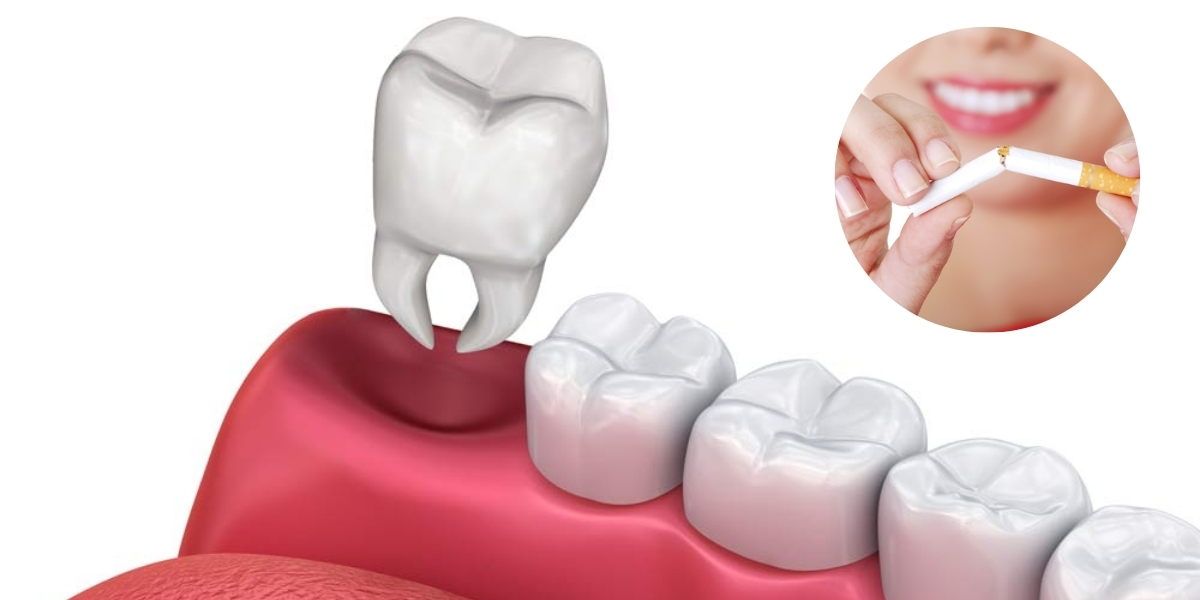
You’ve just had a tooth extraction, and you’re wondering if it’s safe to light up a cigarette. While it might be tempting to resume your smoking habit, especially if it’s a regular part of your routine, it’s essential to understand the potential risks involved. In this comprehensive blog, we’ll explore the effects of smoking on the healing process after tooth extraction and provide helpful tips on how to support your recovery without lighting up.
The Impact of Smoking on Healing
Smoking has a profound effect on the body’s ability to heal, especially after a tooth extraction. The chemicals in cigarettes, including nicotine and tar, can have several detrimental effects on the healing process:
Restricted Blood Flow: Nicotine causes blood vessels to constrict, reducing blood flow to the surgical site. This restriction can impair the formation of blood clots, which are essential for proper healing.
Increased Risk of Infection: Smoking weakens the immune system, making it harder for your body to fight off infections. The chemicals in cigarettes can also create an environment that is more conducive to bacterial growth, increasing the risk of infection at the extraction site.
Delayed Healing: The combination of restricted blood flow and impaired oxygen delivery can significantly delay the healing process. Tissues need oxygen and nutrients to repair themselves, and smoking can deprive them of these essential elements.
Greater Risk of Dry Socket: One of the most common complications of tooth extraction is a dry socket, where the blood clot that forms in the socket is dislodged or dissolves prematurely. Smoking increases the risk of dry sockets, which can be extremely painful and require additional treatment.
Compromised Immune Response: Smoking suppresses the immune system, making it less effective at combating infections. This can prolong the healing process and increase the likelihood of complications.
Risks of Smoking After Tooth Extraction
- Delayed Healing: Smoking interferes with the body’s natural healing process by constricting blood vessels and reducing blood flow to the extraction site. This can delay the formation of new tissue and the closure of the wound, leading to a longer recovery period.
- Increased Risk of Infection: Smoking compromises the immune system, making it less effective at fighting off bacteria and other pathogens. This can increase the risk of infection at the extraction site, which can be painful and require additional treatment.
- Dry Socket: Smoking is a major risk factor for developing a dry socket. This painful condition occurs when the blood clot that forms in the extraction site is dislodged or dissolves prematurely. This exposes the underlying bone and nerves, leading to severe pain and discomfort.
- Compromised Blood Clot Formation: Nicotine and other chemicals in cigarettes can interfere with the formation of a stable blood clot at the extraction site. A stable blood clot is essential for proper healing and protecting the underlying bone and nerves.
- Increased Pain and Discomfort: Smoking can irritate the extraction site, causing increased pain and discomfort during the healing process. This can make it more challenging to eat, speak, and perform daily activities comfortably.
- Delayed Bone Healing: Smoking has been shown to delay bone healing, which is essential for the long-term stability of the surrounding teeth and the success of any future dental procedures.
- Potential for Complications: Smoking after a tooth extraction can increase the risk of complications such as gum disease, tooth decay, and even tooth loss. It can also interfere with the success of dental implants or other treatments in the future.
- Negative Impact on Overall Health: Smoking affects not only oral health but also overall health. It is linked to various health conditions, including heart disease, lung disease, and cancer.
Tips for Supporting Your Recovery
1. Avoid Smoking
As mentioned earlier, smoking can significantly impair the healing process after a tooth extraction. Nicotine and other chemicals in cigarettes can restrict blood flow to the surgical site, delaying healing and increasing the risk of complications. If you’re a smoker, it’s crucial to refrain from smoking during your recovery period. Consider using nicotine replacement therapy or other smoking cessation aids to help you quit. Talk to your healthcare provider for personalized advice and support.
2. Maintain Good Oral Hygiene
Keeping your mouth clean is essential for preventing infection and promoting healing after a tooth extraction. Brush your teeth gently, being careful around the extraction site, and rinse your mouth with warm salt water several times a day to reduce bacteria and inflammation.
3. Use Pain Medication as Directed
It’s normal to experience some pain and discomfort after a tooth extraction. Your dentist or oral surgeon may prescribe pain medication to help you manage this. Take the medication as directed and avoid taking more than the recommended dose. If you’re experiencing severe or prolonged pain, contact your dentist for advice.
4. Apply Ice Packs
Swelling is a common side effect of tooth extraction. Applying an ice pack to the affected area can help reduce swelling and discomfort. Wrap the ice pack in a thin cloth and apply it to your cheek for 10-15 minutes at a time, several times a day.
5. Eat a Healthy Diet
Proper nutrition is essential for healing. Eat a balanced diet rich in vitamins and minerals to support your body’s recovery process. Avoid hard, crunchy, or spicy foods that could irritate the extraction site. Stick to soft foods like yogurt, mashed potatoes, and soup until your mouth has healed.
6. Avoid Alcohol and Tobacco
In addition to smoking, it’s also important to avoid alcohol during your recovery period. Alcohol can interfere with the healing process and increase the risk of complications. Stick to water and other non-alcoholic, non-caffeinated beverages to stay hydrated.
7. Attend Follow-up Appointments
Your dentist or oral surgeon will likely schedule a follow-up appointment to check on your healing progress. It’s essential to attend these appointments so that any issues can be addressed promptly. If you have any concerns between appointments, don’t hesitate to contact your dentist for advice.
8. Be Gentle with Your Mouth
Avoid touching the extraction site with your fingers or tongue, as this can introduce bacteria and disrupt the healing process. Be gentle when brushing your teeth, and avoid using straws, which can create suction and dislodge the blood clot.
Conclusion
Smoking after a tooth extraction can have serious consequences for your oral health and overall well-being. It’s crucial to avoid smoking during your recovery period to ensure a smooth and speedy healing process. So, if you have any questions or concerns about smoking and tooth extraction, be sure to consult your dentist or oral surgeon for personalized advice and guidance. Remember, your health is in your hands, so make the choice that will support your long-term well-being.
